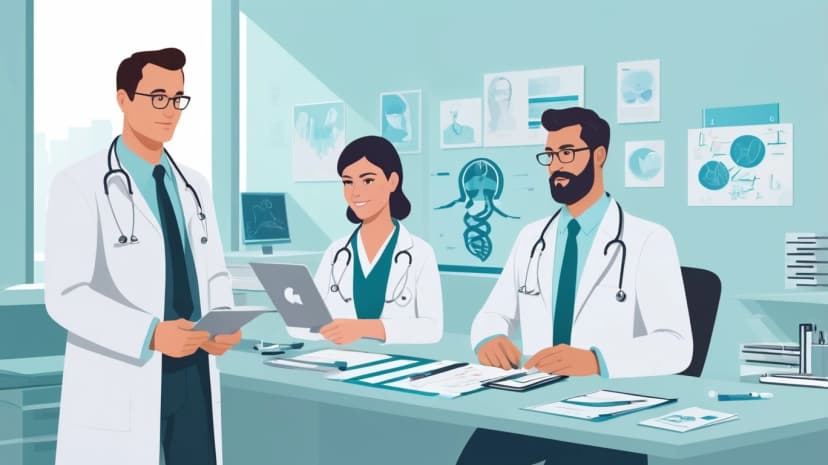As businesses navigate a rapidly changing landscape, digital transformation continues to be the cornerstone of innovation and growth. By 2025, companies will redefine industries, create new business models and accelerate global connectivity. Let's explore the top 6 emerging technologies that are going to shape the digital transformation in 2025:
Artificial Intelligence and Machine Learning (AI/ML)
AI and ML are at the forefront of digital transformation, driving automation, predictive analysis and personalization. According to Gartner's report, the AI future market will reach $125 billion by 2026. This technology helps organizations to make data-driven decisions, optimize operations and improve customer experiences. Here are the top applications of this technology:
- Predictive Analysis: AI tools analyze historical data to forecast trends and make predictions. This helps businesses anticipate customers' requirements and give them the best experience.
- Automation: AI tools help automate repetitive manual tasks that reduce operational costs and person-hours.
- Natural language processing: Virtual assistants like Siri and Alexa use Natural Language Processing to interact with users.
Real-life examples:
Amazon uses AI/ML to optimize the supply chain. The company uses AI to forecast demand and stock the repository accordingly. Its recommendation engine also helps increase sales by offering personalized suggestions to customers.
5G and Advanced Connectivity
The rollout of 5G technology is transforming the way we connect, improving data transfer speed, reducing latency and enhancing device-to-device connectivity. By 2025, 5G will support various organizations and industries. Here are some of its key applications:
- Smart cities: 5G empowers IoT devices that help monitor traffic, utilities, and public safety.
- Healthcare: Remote surgeries and medicines thrive on low latency and high-speed connectivity offered by 5G.
- Industrial applications: Manufacturing plants can leverage 5G for realtime data sharing on devices, which will help enhance efficiency and reduce downtime.
Real-life examples:
South Korea is leading the way in 5G by leveraging it to develop cities. In Seoul, the 5G network helps reduce traffic congestion and improve safety with realtime monitoring.
Blockchain and Decentralized Technology
Blockchain is now evolving beyond cryptocurrency, and it has found its application in supply chain management, healthcare, and identification systems. According to a Statista report, the blockchain industry is about to grow from $7.18 billion in 2022 to $163 billion in 2029. This reflects the level of adoption of blockchain technology across industries. Its decentralized nature helps keep data safe and maintains transparency. Here are the key applications of blockchain technology that go beyond cryptocurrency.
- Supply Chain Management: Blockchain helps in tracking the product from start to finish. This improves authenticity and reduces the risks of fraud.
- Healthcare: Blockchain helps to improve healthcare services by storing the data efficiently and keeping it safe.
- Finance: Decentralized Finance (DeFi) solutions eliminate any intermediaries that offer faster and cheaper financial options.
Real-life examples:
IBM's food trust platform uses blockchain to enhance food safety. It tracks products from farms to shelves, helping to increase consumer trust and reduce contamination outbreaks.
Internet of Things (IoT) and Edge Computing
IoT and edge computing are advancing the way systems connect with each other and ensuring data processing is happening near the source. Edge computing processes data closer to the source rather than entirely relying on the cloud centralized cloud servers. This helps in reducing latency and optimize bandwidth usage. Here are the primary applications of this technology:
- Smart homes and buildings: IoT devices such as smart thermostats, security cameras, and voice-controlled assistants are becoming very popular. These devices collect and monitor users' data in realtime and then help them control environments remotely.
- Industrial IoT: In manufacturing industry, these devices help in tracking down machinery performance, monitor equipment health and also predict maintenance needs. This helps in reducing delays and improving the overall productivity.
- Autonomous vehicles: These IoT devices help collect data in realtimereal time. Sensors gather information in a realtime, realtime environment, and edge computing ensures this data is processed minimally. This leads to fast decision-making and efficient autonomous vehicle operation.
Real-life examples:
General Electric (GE) has implemented IoT technology in its equipment. We can learn how machinery functions and when it needs repair or maintenance through sensors and realtime data collections. Moreover, through edge computing, the company ensured that the data was transferred efficiently and swiftly locally without delays.
Quantum Computing
Quantum computing though in early stage of execution, has a huge potential to transform industries in 2025. While transitional computers use bits to represent data as 0s and 1s, quantum computing uses quantum bits. This helps process vast amounts of data in no time, which is impossible with traditional computers. Here are some of the key applications:
- Drug discovery: Scientists can benefit from quantum computing to simulate molecular structures and reactions. This way, they can develop drugs faster and accelerate the development of treatments for diseases that do not currently have a cure.
- Financial modelling: Quantum Computing can also analyze complex financial portfolios and make more accurate predictions. This could drastically improve risk management strategies in the finance sector.
- Cyber security: Quantum computing is more likely to improve cyber security methods. It can help create advanced encryption methods that are impossible to break.
Real-life examples:
IBM is one of the leading companies in quantum computing research. Through its quantum program, the company is developing quantum computers that businesses and researchers can use to solve complex problems.
Extended Reality (XR)- AR, ML, VR
Extended reality comprises various immersive technologies like Artificial Intelligence, Machine Learning and Virtual Learning. These technologies create immersive and interactive experiences that blend the digital and physical worlds. By 2025, XR technologies can transform industries like education, healthcare, and entertainment to help consumers interact better. Here are some of the popular applications of it:
- Retail and E-commerce: AR allows customers to try products before purchasing. For instance, furniture retailers use AR to help customers see how the furniture looks in their homes before buying.
- Education and training: AR and VR are helping classes become more engaging and immersive. This allows students and professionals to find new ways to engage and learn better.
- Healthcare: XR technologies are being used for surgery simulations, remote consultations, and physical therapy. VR is helping doctors practice surgeries in a risk-free environment, which has improved patient treatment and efficiency.
Real-life examples:
IKEA's AR app helps customers see how a furniture piece looks in their space. Customers can also see how their phone will look in their home by simply pointing their phone in the empty space.
As we look ahead to 2025, technologies like blockchain and XR will reshape how businesses work. Upskilling and reskilling are necessary to ensure your workforce is adapted to these new technologies. It is also essential to help your workforce face any technological challenges. This is where we require thought leadership. We need to educate the workforce to adapt and adopt these changes for the better. Companies and individuals who embrace these technologies in 2025 will gain a significant advantage over others and stay competitive in the market.





